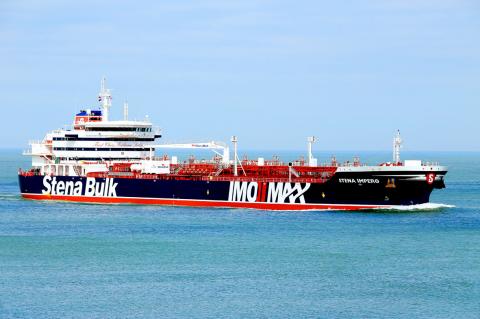Iran’s Revolutionary Guard Corps was holding a British-flagged oil tanker after seizing it in the Strait of Hormuz amid soaring tensions in one of the world’s critical energy chokepoints. British officials have demanded the immediate release of the vessel.
The Stena Impero crashed into a fishing vessel and had been taken to the Bandar Abbas port for investigation, Iran’s state-run Islamic Republic News Agency said.
The crew — which has 18 Indian nationals and five others, including from Russia, the Philippines and Latvia — would remain on board for safety reasons, it reported, citing Allahmorad Afifipour, the head of the Ports and Maritime Organization in Iran’s Hormozgan Province.

Photo: EPA-EFE / Jan Verhoog / Marinetraffic.com
None of the crew are British nationals, he said.
British Secretary of State for Foreign and Commonwealth Affairs Jeremy Hunt and other top British officials held an emergency meeting on Friday evening over the capture of the Stena Impero and a second vessel, which was later released.
The British Foreign and Commonwealth Office said in a statement that “our response will be considered and robust, and there will be serious consequences if the situation is not resolved.”
It also advised that British ships should “stay out of the area for an interim period.”
Iran was retaliating against the seizure of an Iranian ship by Gibraltar, Hunt said on Twitter.
The second ship, the Liberian-flagged Mesdar, re-established contact with its UK-based manager and was moving away from the Iranian coast, according to ship tracking data compiled by Bloomberg.
US President Donald Trump said he would be “working with the UK” and suggested the latest developments justify his harsher approach toward Tehran.
“This only goes to show what I’m saying about Iran: trouble, nothing but trouble,” Trump said.
France and Germany expressed their support for the UK, with both nations demanding the immediate release of the ship and its crew.
On Friday night, US Central Command announced it was putting in place “a multinational maritime effort” called Operation Sentinel that would “increase surveillance of and security in key waterways in the Middle East to ensure freedom of navigation in light of recent events in the Arabian Gulf region.”
A spokesman for the Iranian Guardian Council said that the move against at least one of the ships was in retaliation for the British seizure off Gibraltar of a tanker carrying Iranian crude earlier this month.
Earlier in the day, a court in Gibraltar ordered the continued detention of the vessel, the Grace 1, for another 30 days, after it was held on suspicion of transporting oil to Syria.
Iran has denied that was the tanker’s destination.
“The rule of retaliation is something that’s recognized within international law and is used in relation to wrong measures taken by a government,” council spokesman Abbasali Kadkhodaei told the Islamic Republic News Agency.

Authorities have detained three former Taiwan Semiconductor Manufacturing Co (TMSC, 台積電) employees on suspicion of compromising classified technology used in making 2-nanometer chips, the Taiwan High Prosecutors’ Office said yesterday. Prosecutors are holding a former TSMC engineer surnamed Chen (陳) and two recently sacked TSMC engineers, including one person surnamed Wu (吳) in detention with restricted communication, following an investigation launched on July 25, a statement said. The announcement came a day after Nikkei Asia reported on the technology theft in an exclusive story, saying TSMC had fired two workers for contravening data rules on advanced chipmaking technology. Two-nanometer wafers are the most

NEW GEAR: On top of the new Tien Kung IV air defense missiles, the military is expected to place orders for a new combat vehicle next year for delivery in 2028 Mass production of Tien Kung IV (Sky Bow IV) missiles is expected to start next year, with plans to order 122 pods, the Ministry of National Defense’s (MND) latest list of regulated military material showed. The document said that the armed forces would obtain 46 pods of the air defense missiles next year and 76 pods the year after that. The Tien Kung IV is designed to intercept cruise missiles and ballistic missiles to an altitude of 70km, compared with the 60km maximum altitude achieved by the Missile Segment Enhancement variant of PAC-3 systems. A defense source said yesterday that the number of

A bipartisan group of US representatives have introduced a draft US-Taiwan Defense Innovation Partnership bill, aimed at accelerating defense technology collaboration between Taiwan and the US in response to ongoing aggression by the Chinese Communist Party (CCP). The bill was introduced by US representatives Zach Nunn and Jill Tokuda, with US House Select Committee on the Chinese Communist Party Chairman John Moolenaar and US Representative Ashley Hinson joining as original cosponsors, a news release issued by Tokuda’s office on Thursday said. The draft bill “directs the US Department of Defense to work directly with Taiwan’s Ministry of National Defense through their respective

Tsunami waves were possible in three areas of Kamchatka in Russia’s Far East, the Russian Ministry for Emergency Services said yesterday after a magnitude 7.0 earthquake hit the nearby Kuril Islands. “The expected wave heights are low, but you must still move away from the shore,” the ministry said on the Telegram messaging app, after the latest seismic activity in the area. However, the Pacific Tsunami Warning System in Hawaii said there was no tsunami warning after the quake. The Russian tsunami alert was later canceled. Overnight, the Krasheninnikov volcano in Kamchatka erupted for the first time in 600 years, Russia’s RIA